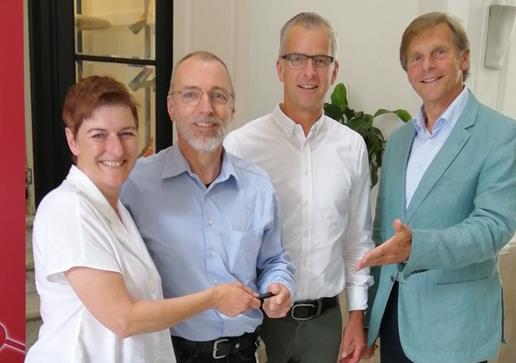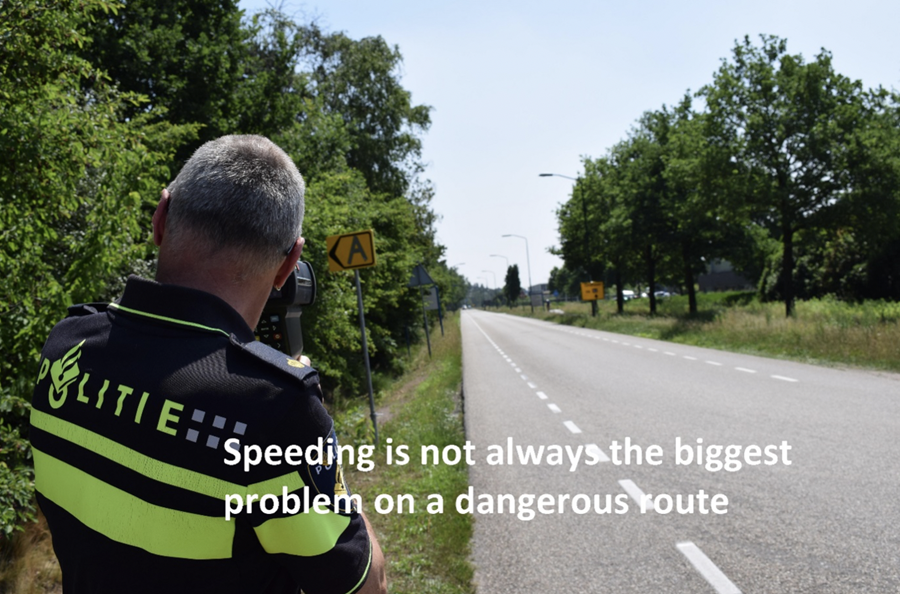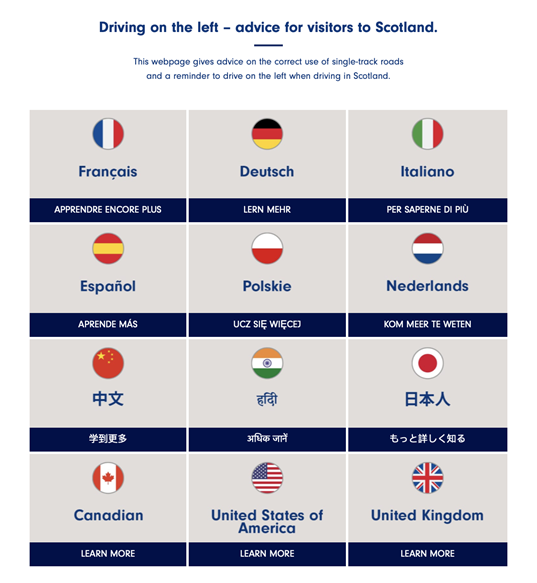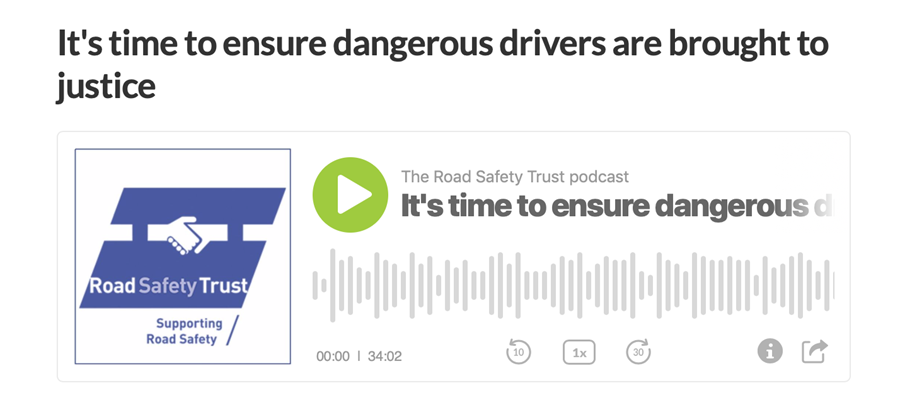
Today we begin the 100-day countdown to #ProjectEDWARD 2019
Stand by, everybody...
we are switching on the #ProjectEDWARD countdown clock today...
in just a few minutes from now!
we are switching on the #ProjectEDWARD countdown clock today...
in just a few minutes from now!
Join us LIVE on Twitter...
TISPOL President Volker Orben has also recorded a short message for #ProjectEDWARD. You can watch that right here:
Please make use of our short introductory #ProjectEDWARD videos - all free to download and share!
Please don't waste this opportunity to share the #ProjectEDWARD information!
Please ensure you download the appropriate version for you, and take steps to:
- put it on your website
- share it on social media
- share with road safety stakeholders in your country
- send it to your broadcast media and press organisations
- maximise its use, starting today!
Here are the download links:
All change at the OPG...

TISPOL's
Operations Group (OPG) is now in the safe hands of the Netherlands,
following yesterday's official handover in Brussels.
The OPG coordinates
TISPOL's pan European police checks and subsequently reports on how
many road users offended against traffic rules within a given period of
time. This data is vital in understanding the main causes of fatal
and serious collisions. It is also the reason why all TISPOL member
countries support the OPG.
Coordination of the OPG was previously the
responsibility of Germany, with the highly capable Sandra Auen fulfilling the role of OPG Secretary.
The new OPG Chair is TISPOL Vice President Egbert-Jan van Hasselt, and the new OPG Secretary is Henk Jansen.
In the picture above, we see Sandra, Henk, TISPOL President Volker Orben and Egbert-Jan.
ETSC REVIVE Project: Final Conference
Today at the Thon Hotel EU, Brussels
1400 to 1800
Today at the Thon Hotel EU, Brussels
1400 to 1800
Sharing best practice in Emergency Medical Service and Rescue/Fire Service across the EU
Improvements
in emergency response can help prevent deaths and life-changing
injuries in road collisions. However, emergency response has not been
getting a fair share of attention in terms of research, best practice
exchange and measures in the European Union. The aim of the Revive
project is to map Emergency Medical Service (EMS) and Fire and Rescue
Service (FRS) practices in the EU28 and raise the profile of both EMS
and FRS on the national and European political agendas.
The
Revive project aims at improving post-crash care provided by EMS and
FRS in order to mitigate the consequences of road collisions. One of the
key outcomes of the project is to have established an international
network of experts, researchers and practitioners in the field of
post-collision care and emergency response.
Netherlands: speed, risk and
effective solutions
effective solutions

Speed
is only part of the problem on trajectories with many (fatal)
collisions. Other causes, such as road layout, also play a role in
one-third of the most unsafe routes in the Netherlands. This is
reflected in a new STAR study, a collaboration between police, insurers
and software developer VIA.
On
roads where other causes play a role, relatively most victims fall. The
danger of this type of road is also reflected in the risk figure. Roads
with many accidents and where there is no speeding, especially 50 and
80 roads, have a risk figure that is 3.5 times higher than roads with
many accidents where there is a speeding.
According
to the researchers, a possible explanation for this may be that these
roads are designed more safely. This can give a safer feeling, which
means that people drive faster.
Inexpensive measures
Dangerous
roads where there are many casualties, and where people drive too fast,
can be made safer with enforcement. On dangerous roads that are not
driven too fast, "relatively cheap" infrastructural measures can thus
improve them a lot. What exactly, that must be viewed per route.
VIA, which develops
traffic engineering software, conducted the research. The company used
their new software tool Cross. The tool combines the accident score with
explanatory variables such as speed and road layout.
Helping
to respond to the future and reducing risks is what you can do with
Cross. This approach is in line with the new Strategic Road Safety Plan
2030. It also focuses on that proactive and the risk-based approach.It
also shows why the approach to road safety (the three E's) comes first
with Engineering, followed by Education and lastly Enforcement.If you
look at where accidents can occur, you can already take action now, is
the idea.
Scotland: new campaign reminds tourists to drive on the left
Police
Scotland and Road Safety Scotland have joined members of the British
Vehicle Rental and Leasing Association (BVRLA), along with local MSP,
Kate Forbes at Urquhart Castle, Inverness, to launch a campaign to
remind motorists to ‘Drive on the Left’ when visiting Scotland.
Latest
figures record ‘inexperience of driving on the left’ as a contributory
factor in 65 collisions and, following a number of serious collisions
last year, the campaign is designed to coincide with the peak tourist
season in Scotland, encouraging visitors to enjoy Scottish roads safely.
Road Safety Scotland
produces a ‘Driving in Scotland’ tourist information leaflet addressing
the issues faced by those not used to driving on the left or the concept
of single-track roads. Fifty thousand were distributed in the last
year.
Michael
McDonnell, Director of Road Safety Scotland said: “We want all visitors
to Scotland to return safely from their travels and the new campaign
aims to raise awareness and remind people to drive on the left at all
times, which is particularly important after they’ve taken a break or
when the roads are quieter.
“With
the tourist season
upon us our new ‘Driving in Scotland’ information leaflet also offers
practical advice about looking both ways at junctions, driving on
single-track roads and provides tips for planning your journey in
advance, taking regular rest stops to avoid fatigue.”
UK: too many dangerous drivers are escaping justice, researchers warn
Researchers
from the University of Leicester led by Professor Sally Kyd have
issued a warning that too many prosecutions for dangerous driving fail
to materialise, due to lack of funding and regional inconsistencies in
Crown Prosecution Service (CPS) demands on police.
Publishing
a report at the end of a research project funded by the Road Safety
Trust, the team looked at the examination and enforcement of the
offences of careless driving, dangerous driving and using a mobile phone
whilst driving.
Watch a short video about
the project below...
Professor
Sally Kyd and her colleague Dr Steven Cammiss have recorded a 30-minute
podcast in which they discuss the findings of their research and offer
recommendations for lawmakers and police officers:
Ireland: new strategy needed for sustained casualty reduction, says RSA chief
A
key target in the Irish Government’s Road Safety Strategy to reduce
annual road deaths to 124 or less by 2020 is unlikely to be met, the
Road Safety Authority has said.
Speaking
at the authority’s annual conference in Dublin last week, chief
executive Moyagh Murdock said three out of the past four years had seen a
record low in the number of people killed on the State’s roads. Last
year’s figure of 146 was the lowest since record-keeping began.
But, she said, to reach the 2020 target a further 15 per cent
reduction in fatalities was required, and Ms Murdock said; “I think we have to accept that the target may be missed."
The
number of people killed on the roads this year stood at 72 on Thursday
13 June, an increase of six on the same period last year.
Finally, did you try our alcohol quiz in the last bulletin?
Here are the answers:
Q1: How is alcohol absorbed into your system?
A Through the kidneys (25% chose this)
B Alcohol can't be absorbed (19% chose this)
C Through the lungs (4% chose this)
D Through the stomach and intestines (52% chose this)
A Through the kidneys (25% chose this)
B Alcohol can't be absorbed (19% chose this)
C Through the lungs (4% chose this)
D Through the stomach and intestines (52% chose this)
Q2: Which of the following will help your body eliminate alcohol more quickly?
A Strong coffee (6% chose this)
B Heavy meal (9% chose this)
C Shower (No one chose this)
D Nothing (85% chose this)
A Strong coffee (6% chose this)
B Heavy meal (9% chose this)
C Shower (No one chose this)
D Nothing (85% chose this)
Q3: Which organ(s) in your body is/are responsible for expelling alcohol from your system?
A Kidneys (31% chose this)
B Liver (62% chose this)
C Lungs (3% chose this)
D Pancreas and gall bladder (4% chose this)
A Kidneys (31% chose this)
B Liver (62% chose this)
C Lungs (3% chose this)
D Pancreas and gall bladder (4% chose this)
Q4 Where does your body store alcohol?
A Spleen (5% chose this)
B Appendix (No one chose this)
C It cannot store alcohol (92% chose this)
D Brain (3% chose this)
A Spleen (5% chose this)
B Appendix (No one chose this)
C It cannot store alcohol (92% chose this)
D Brain (3% chose this)
Q5 Which of the following can determine how alcohol affects you?
A Weight, age, gender and metabolism (14% chosen this)
B What you have just eaten (No one chose this)
C How tired you are (1% chose this)
D All of the above (85 chose this)
A Weight, age, gender and metabolism (14% chosen this)
B What you have just eaten (No one chose this)
C How tired you are (1% chose this)
D All of the above (85 chose this)
25 people achieved 5 out of 5, so well done!









Δεν υπάρχουν σχόλια:
Δημοσίευση σχολίου